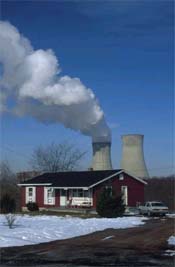 |


|
|
U.S. Nuclear Security Falls Short, |
|
By Cat Lazaroff Environmental News Service
 WASHINGTON, DC, (ENS) - Lax security at the Energy Department's nuclear weapons sites could allow terrorists to detonate bombs at the sites, warned Representative Edward Markey at a press conference today. The Energy Department responded with a strongly worded statement calling Markey's allegations "false and misleading." WASHINGTON, DC, (ENS) - Lax security at the Energy Department's nuclear weapons sites could allow terrorists to detonate bombs at the sites, warned Representative Edward Markey at a press conference today. The Energy Department responded with a strongly worded statement calling Markey's allegations "false and misleading."
Representative Markey, the Massachusetts Democrat who co-chairs the Bipartisan Task Force on Nonproliferation, released a letter which he sent to Department of Energy (DOE) Secretary Spencer Abraham regarding security problems at DOE nuclear weapons facilities such as Los Alamos National Laboratory, Rocky Flats Environmental Technology Center near Denver, and Lawrence Livermore National Laboratory. Ten DOE sites, some of which are located near urban areas such as Denver, Colorado and the Bay Area of California, contain enough weapons grade plutonium and highly enriched uranium to build a crude nuclear bomb. Markey said nuclear experts report that terrorists would need about 10 kilograms of plutonium (22 pounds) and 50 kilograms (110 pounds) of uranium to build a bomb. Markey says there have been numerous security problems at these DOE facilities. "Mock 'terrorists' were able to access the weapons grade uranium and plutonium in security tests [force on force exercises] at DOE facilities more than 50 percent of the time," Markey said. Had these been real attacks, suicidal terrorists might have been able to use the plutonium or uranium to construct and detonate so called dirty bombs, which could spread radioactive materials over a large area, or homemade nuclear bombs which could achieve the same explosive force as a small nuclear weapon. "Experts have told me that a group of suicidal terrorists could, once inside the facility, quickly build and detonate a dirty bomb or a homemade nuclear bomb capable of achieving explosive critical yield," said Markey. General John Gordon, administrator of the National Nuclear Security Administration and DOE's Under Secretary of Energy Security at Nuclear Weapons Facilities, said Markey's statements are not true. "Allegations that the Department of Energy has lax security at its nuclear weapons facilities are false and misleading," Gordon said today in a prepared statement. "Charges that there is a 50 percent failure rate in our security tests are simply untrue." Gordon said he has assessed the security conditions at DOE nuclear sites many times, "and I personally reviewed our posture immediately following the terrorist attacks in September," he added. "Nuclear material is not at risk at Department of Energy facilities," Gordon concluded. Onsite conditions at DOE facilities were not the only problems identified by Representative Markey, however. For example, the DOE's Transportation Security Division regularly transports nuclear weapons materials on public highways from site to site. Recent press reports have detailed both Al Qaeda members' attempts to obtain nuclear materials as well as their desire to attack U.S. nuclear facilities, Markey charged.
The Representative said today that the storage vaults and other rooms used to store weapons grade uranium and plutonium may not be adequately protected against impacts from large commercial aircraft or the detonation of large truck bombs nearby. Vaults containing weapons grade plutonium or uranium have been found left unlocked and open for eight hours a day, five days a week, at some DOE sites, Markey charged. The DOE sets security levels for its facilities based on a Design Basis Threat, but those regulations may not reflect the type of threat that the U.S. experienced on September 11. The DOE's rules require that the facilities protect against a small group of attackers, but do not assume that the attackers may have access to sophisticated weaponry, including chemical and biological weapons. DOE preparations may not protect against very large truck bombs such as those that have been used in other terrorist attacks, Markey said. "We aggressively protect our people, facilities, and material, and we display a formidable security posture to potential attackers," Gordon responded. "Our forces are well trained and well equipped. They are tested by outside challengers, often to failure - so we know where weaknesses are. Then we fix the problem." Markey charged that for decades, DOE management has been ignoring critical reports on security of its facilities by presidential task forces, General Accounting Office, Congressional, internal DOE and independent experts. The agency has failed to allocate sufficient resources to security, and fails to oversee security at its facilities to ensure that it is adequate, he said. DOE personnel have been found to have improperly altered security ratings to make it look as though security was better than it was, Markey added. "DOE has been ignoring expert critical reports on security of its facilities for decades, and as a result we are all at risk. This has never been acceptable, and it is even less so given the events of September 11," said Markey. Markey also noted that the DOE has sometimes retaliated against whistleblowers who bring security flaws at agency facilities to the attention of their superiors. General Gordon said that Markey is creating "a climate of fear grossly disproportionate to the risks to the public." "Such unfounded allegations are a disservice to the communities that are home to our national defense facilities," Gordon said. "There is no question that DOE takes security seriously as a critical part of our mission. The strong group of professionals who protect our sites are a source of pride and it is grossly unfair to characterize individuals or the system as uncaring or ignoring problems." |

© 1997-2002 BEI
 Rep. Edward Markey Introducing Nuclear Security Act with Senators Joseph Lieberman, Hillary Clinton and Harry Reid
Rep. Edward Markey Introducing Nuclear Security Act with Senators Joseph Lieberman, Hillary Clinton and Harry Reid